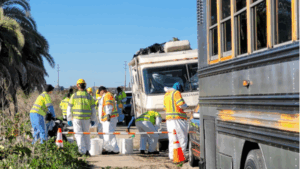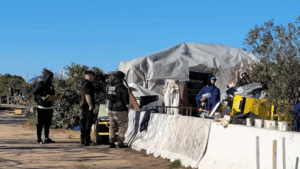
The Struggle of Vehicular Residents and the Venice Justice Committee
Venice, Los Angeles CA. A neighborhood for poor people, for renters who thrived in cheap available apartments on the rundown back streets, a neighborhood famous for its countercultural vibe and freedom, where the wide beach and boardwalk teemed with performers, drag queens, artists, and outcasts. By the 1980’s, it became a neighborhood where a growing population of unhoused people lived, spending their nights on the ground and in vehicles.
Peggy Lee Kennedy grew up in Venice in the ‘60’s and ‘70’s, and emerged as a leading fighter for her neighborhood. Big real estate money – and the politicians who serve them – colluded to take over Venice and make it what it is today: a neighborhood for the white and the wealthy, mobilizing the police to get rid of the “undesirable” unhoused residents who had the tenacity to refuse, resist, and stay.
Kennedy describes the lost Eden of her teenage years. “When the circus came to town and those nomads needed a place to stay, they stopped in Venice. The Deadheads, following the band, migrated through Venice. The big nude beach thing…the next thing we knew people were walking through town, totally naked!”
She describes how residents fostered their culture and strong sense of community. “It was mixed. My high school had every ethnicity imaginable – 1/3 white, 1/3 Black, 1/3 Latino.” She reflects, “We were working class, though of course we didn’t know that, then, and we also didn’t know we were targeted for elimination.”

The process of displacement of the people who used to live in Venice began with development of the neighborhood next door, Marina Del Rey. The native people, Tongva and Shoshone, once made their home in the wetlands there. Despite their ecological importance, the area was dug out in the 60’s for a yacht harbor.
“That was the beginning of the end,” Kennedy says. Then came the demolitions, the prosecution of code violations, the exceptions to rent stabilization, conversion of housing to short term rentals, the construction of luxury housing, the “market rate” rentals that locals couldn’t afford.
Political disempowerment went hand in hand with the process of displacement and dispossession. City hall used every strategy — discrediting and breaking down local structures and leaders, redistricting to replace local representation, promoting and electing fake “progressive” politicians, activating new, affluent residents, popularizing their narrative of hatred for the homeless.
“We fought and we fought and we fought,” Kennedy says. “The fighters and advocates – we are all socialists, or Peace and Freedom, or whatever.” There were many blows. One time the Sheriff refused to investigate the theft of their Food Not Bombs van. Another time, the Police Department shined lights in her windows at night to scare her off.
In 2001, Kennedy and allies founded the Venice Justice Committee. They filed lawsuits and won many – including an historic decision in 2018 striking down the city’s attempt to block them from gathering signatures and donations, or even passing out leaflets, on the boardwalk.
“Meanwhile, they were demolishing Venice and putting up giant buildings, hounding people, pounding on their doors, pressuring them to ‘cash out.’” She points out that the number of Black people started to drop, “their little craftsman homes demolished for luxury mansions.” The city conducted huge operations to get rid of Black people – in 2006, a multi-agency warrant campaign, which included the Sheriff and LAPD. “Kids driven out, grandmas forced out, people who had survived code enforcement, the crack epidemic.” Oakwood, the historic Black area of Venice, where people had lived for generations, was uprooted.
Deliberately, in the open and in secret, the political attack focused on residents who lived in vehicles, even as their population exploded. Of course, it goes far beyond one politician, city planner, or billionaire/multimillionaire developer – and includes the current city council representative, Traci Park – but Bill Rosendahl is a prominent example.
Rosendahl, who represented Venice on the City Council at the time, had the following message for vehicular residents and advocates like Peggy: “If you are defined as homeless you are not welcome in Venice. If you operate an RV you are being targeted, and just so you understand, we’re going to threaten you, intimidate you, without offering you any reasonable solutions based on respect and dignity.”
In an article written in 2016 in the Venice Beachhead, a local newspaper, Kennedy identified the legal tools that were used to outlaw vehicular residents. “Bill Rosendahl brought in two new anti-homeless L.A. City laws (OPD [Overnight Parking Districts requiring permits only available to housed residents] OVO [Oversized Vehicle Ordinance outlawing parking between 2 am and 6 am]) and used the Living in Vehicle law (LAMC 85.02)…”
In tandem with this legal attack, “Rosendahl appropriated funds to study a never created safe parking program, which was an imaginary carrot – illusionary compensation for the harsh, inhumane, unconstitutional treatment of vehicle-housed people in Venice.” In reality, “NOT ONE PARKING SPACE WAS EVER CREATED IN VENICE via this safe parking program pipe dream.”
Kennedy notes that the use of 85.02 led to a strong rebuke of the City in 2014, when Venice Justice Committee and allies brought a federal civil rights lawsuit, Desertrain v. LA, against its enforcement. The court found the ordinance, which outlawed “living” in a vehicle, to be unconstitutionally vague, leading to selective and discriminatory enforcement against the unhoused for even “staying in a car to get out of the rain.”
The attack against vehicular residents had a personal and political impact on Kennedy. “Some of the harmed who were vehicle-housed in Venice were my friends. Some got sick. Some died. Others were permanently driven from their home. Later, after the harm had been done, some were housed and used as his success story.”
The win in the Desertrain case was short-lived. The ordinance was amended and enforced with new language. Today, Kennedy says, “It’s sweeps, and towing, towing, towing.”
But this is not the end of the story. Affordable housing advocates continue to fight, after ten years, for Venice Dell, a project which would house over 100 low income and unhoused residents.
And the beat goes on. “We had to do something,” Kennedy says. On June 25, 2025, the Venice Justice Committee, with the UCLA Luskin Institute on Inequality and Democracy, released “Keep Moving: The West LA Vehicle Residents Survey,” which analyzes the findings of a face-to-face survey of 99 vehicle residents residing in West Los Angeles over a year’s time.
The report opens, “Los Angeles is a starkly unequal city, one in which the accumulation of wealth in gated and guarded estates rests upon the impoverishment of workers and tenants.”
The analysis is unflinching: in a city where there are 13,549 vehicle dwellings, used by residents of these vehicles as “a personal safety net,” the main strategy of managing mass homelessness is “banishment,” or forced mobility through criminalization, described as “a coalescing strategy across municipalities that displaces and dispossesses vehicle residents in an effort to discipline and push them into whatever program government officials are pushing at the time.”
The primary tools are parking restrictions – there are 1,367 restricted parking zones across the city, according to the progressive LA Controller Kenneth Mejia – and then, as a consequence of these restrictions, the tickets, towing and impoundment that make it virtually certain that the resident will never see their vehicle again.
As the Venice Justice Committee report points out, this “vicious cycle of debt and dispossession for minor reasons” isn’t unique to vehicle residents, as it disproportionately impacts poor and working-class people generally and makes up a substantial portion of impounded vehicles, earning these tows the moniker “poverty tows.”
The Venice Justice Committee report is visionary. It is practical and factual. It makes clear recommendations that would go far to solve the crisis of unhousing the people:
“While governments across California and beyond expand policies of displacement and dispossession of vehicle residents, parking stability paired with supportive services that enable access to affordable housing offers an alternative vision.”
The Venice Justice Committee report testifies to the power of engagement, tenacity, and unity of a dispossessed and impoverished class that is under fire, and leaders, like Peggy Lee Kennedy, who carry the fight forward. “We have to change the narrative,” says Kennedy. “That means listening to lived experience.”


This article is so excellent. It’s the concrete facts, presented over a long time period that so well describes the experiences of people all over the country who are being pushed out for the wealthy to make their millions with gentrification. It’s happening around the world, too. The details may be different but the process is the same.